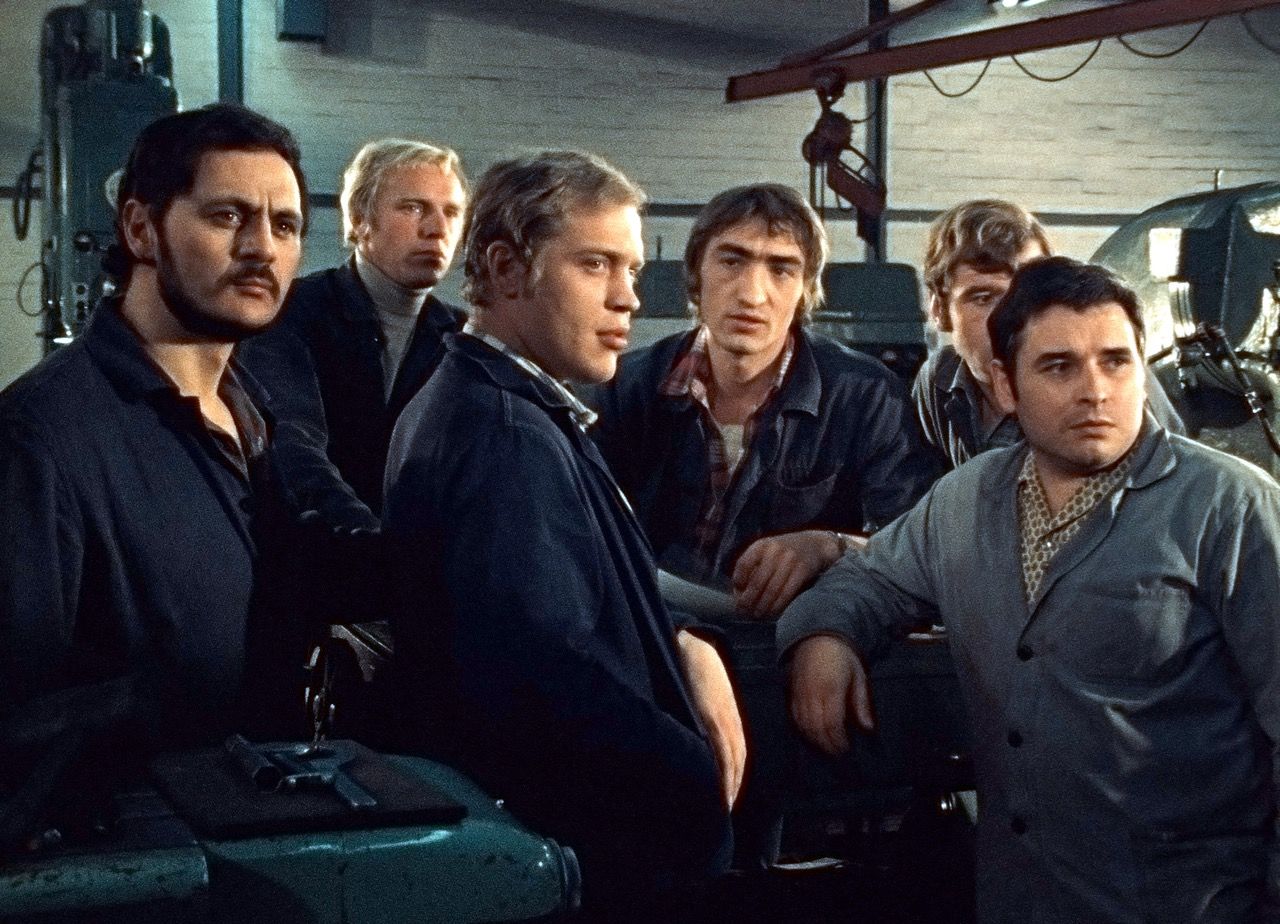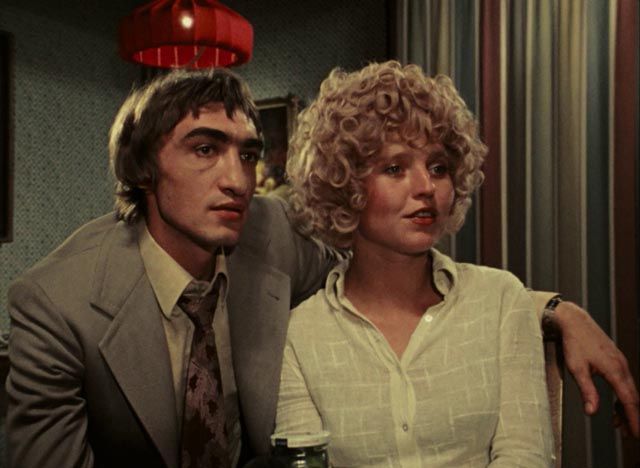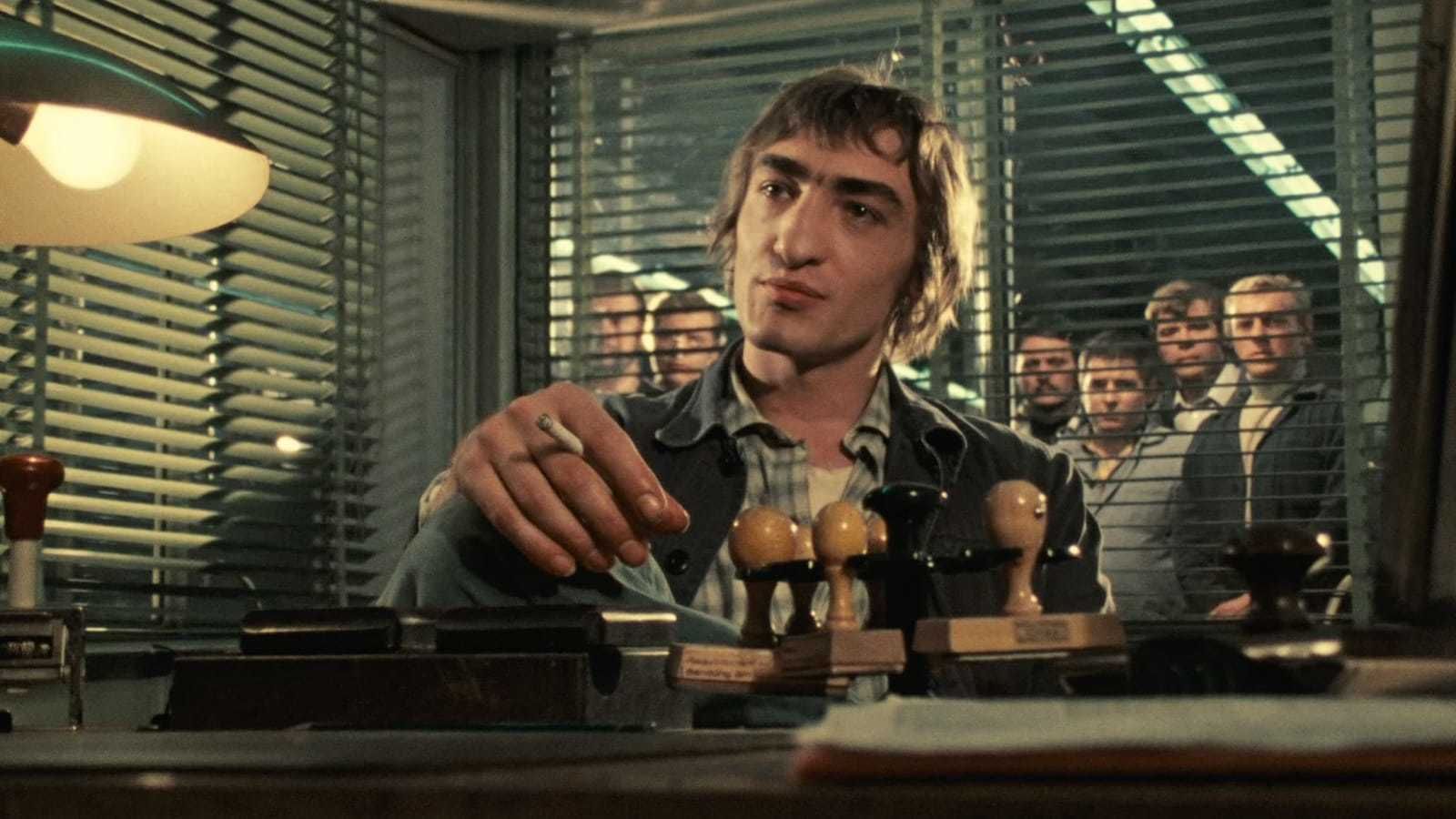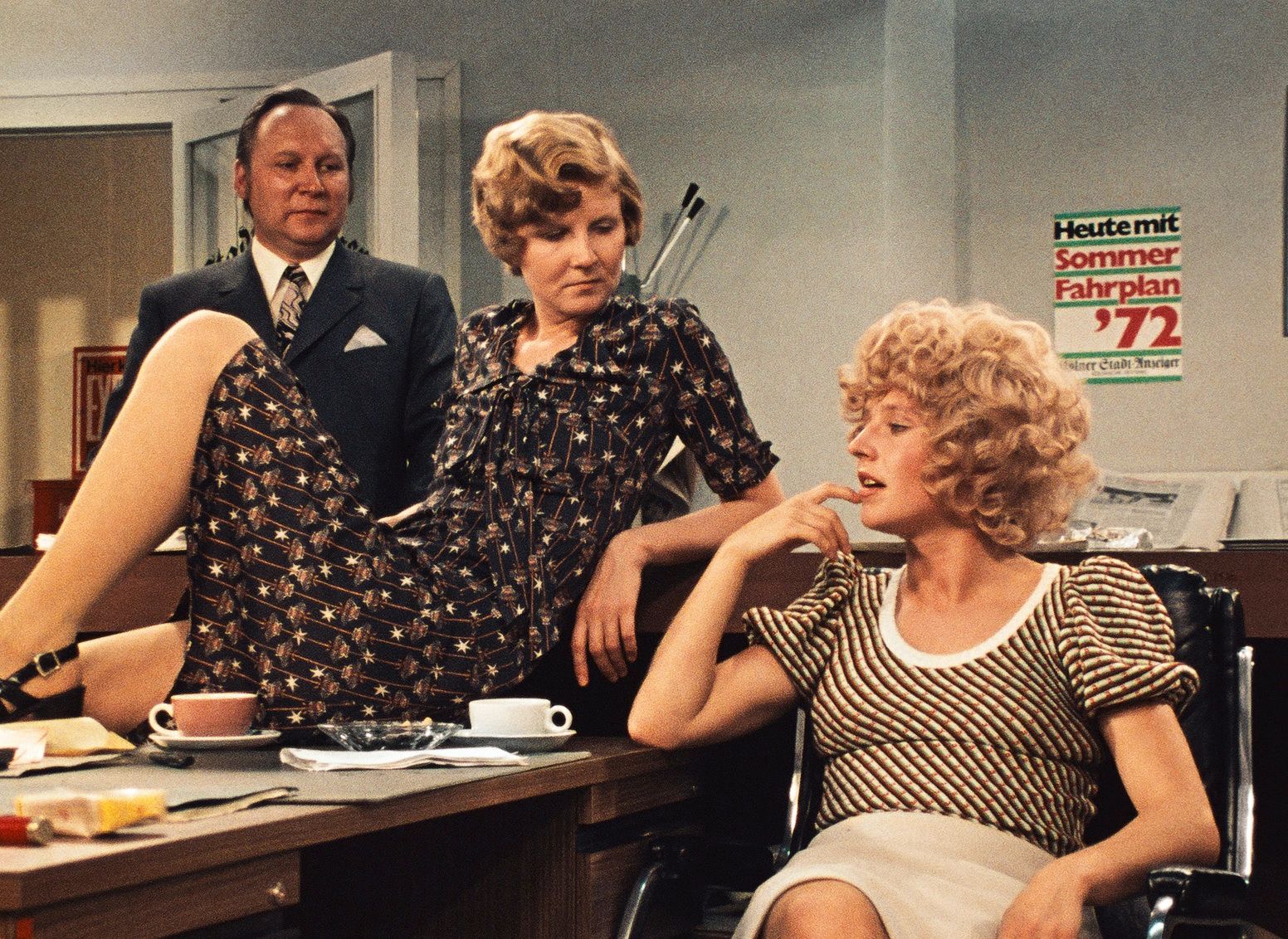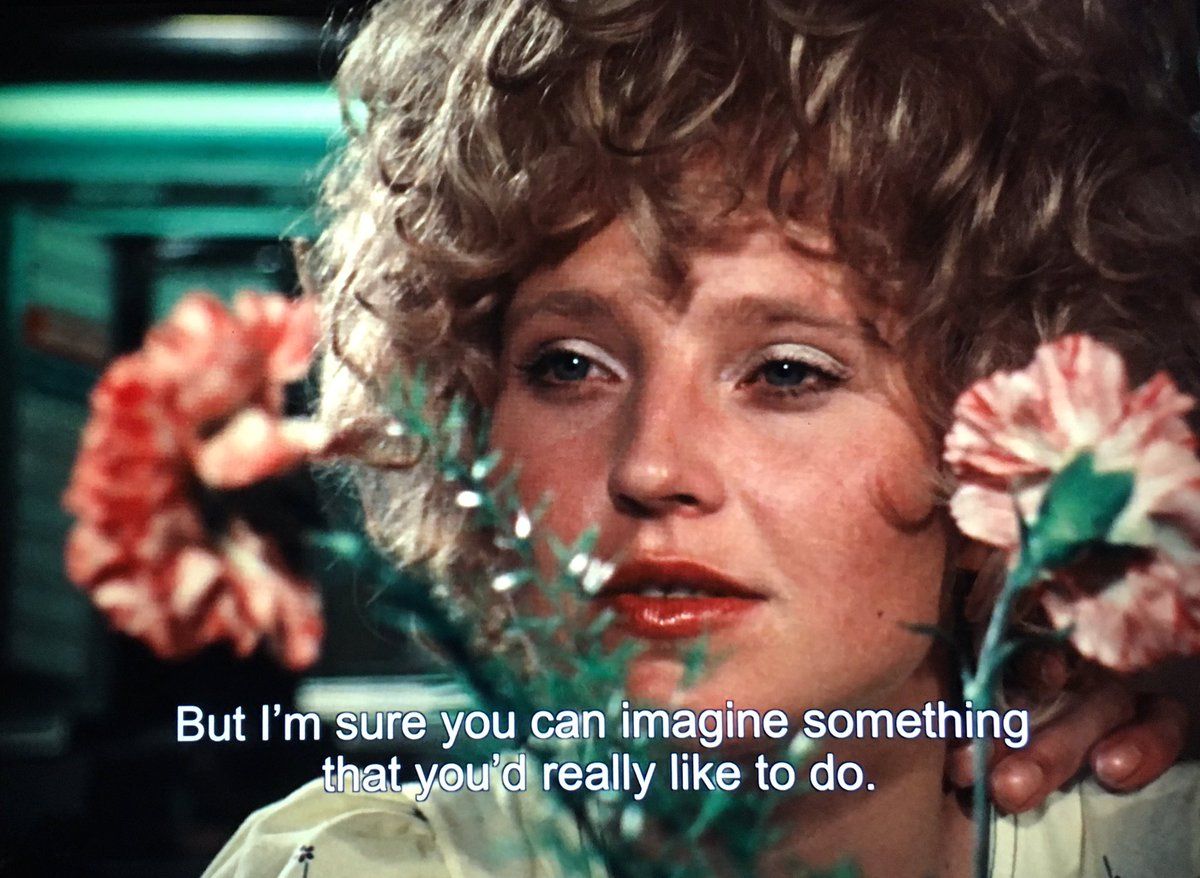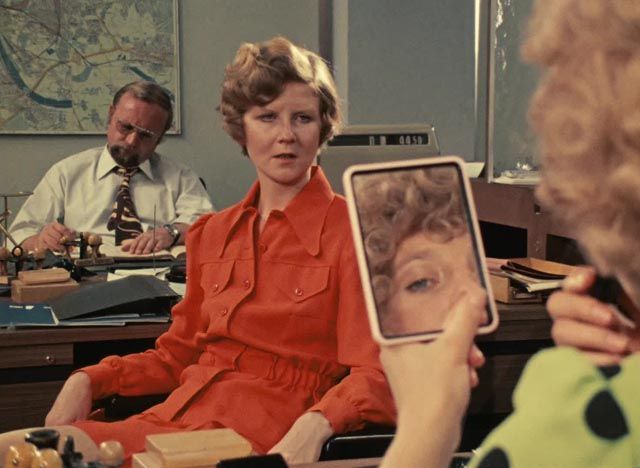Making a Day: Fassbinder’s Eight Hours Don’t Make a Day and the Work of Living
Dana Kopel
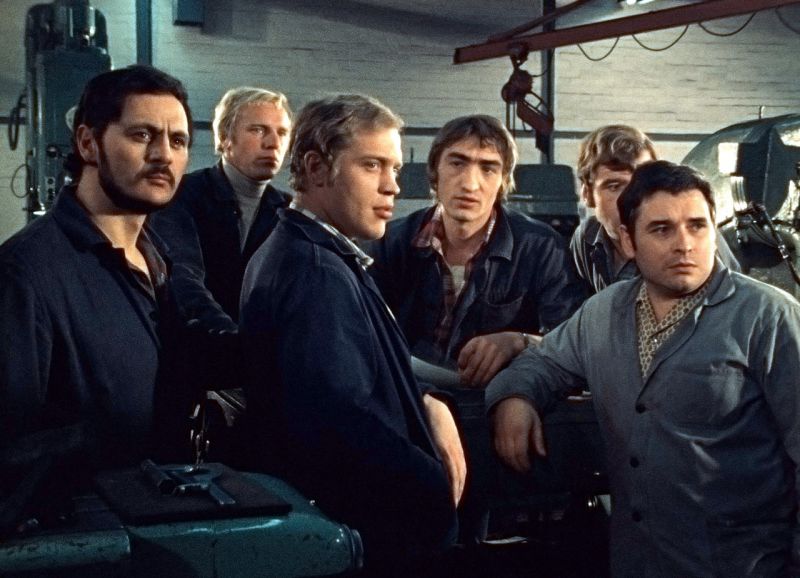
[1]
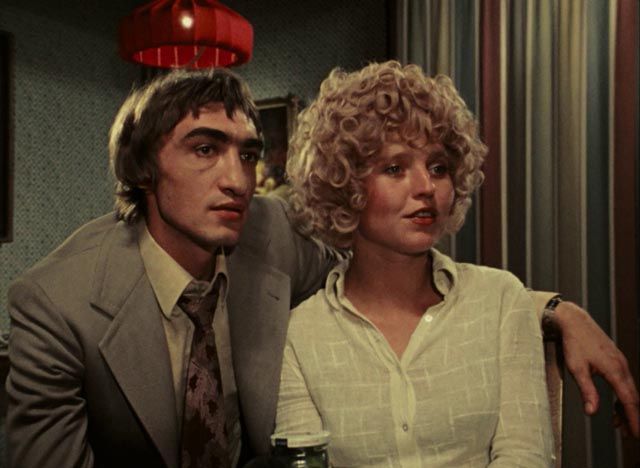
[2]
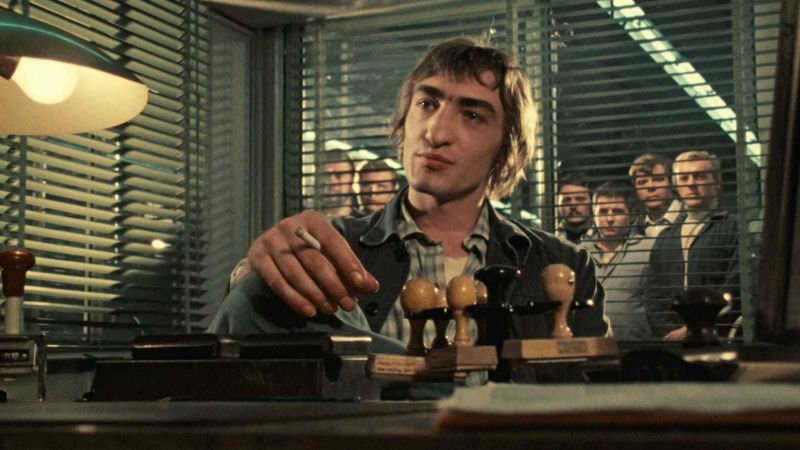
[3]
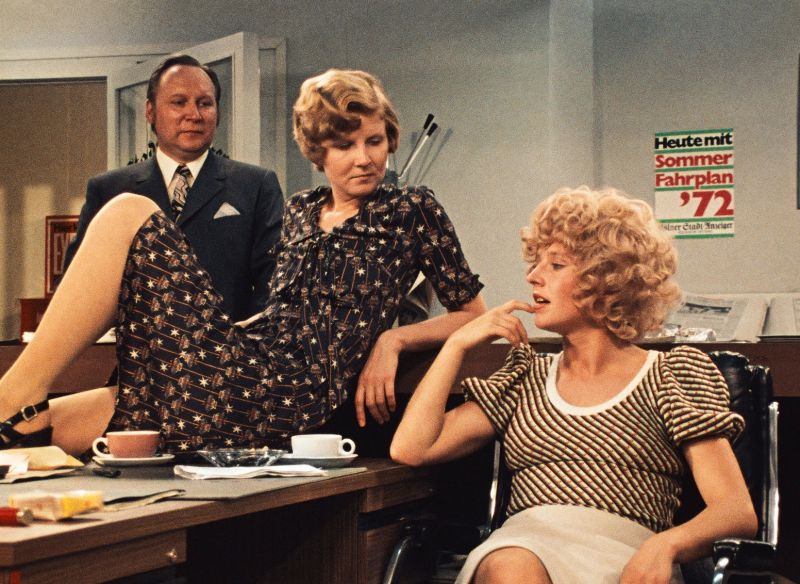
[4]
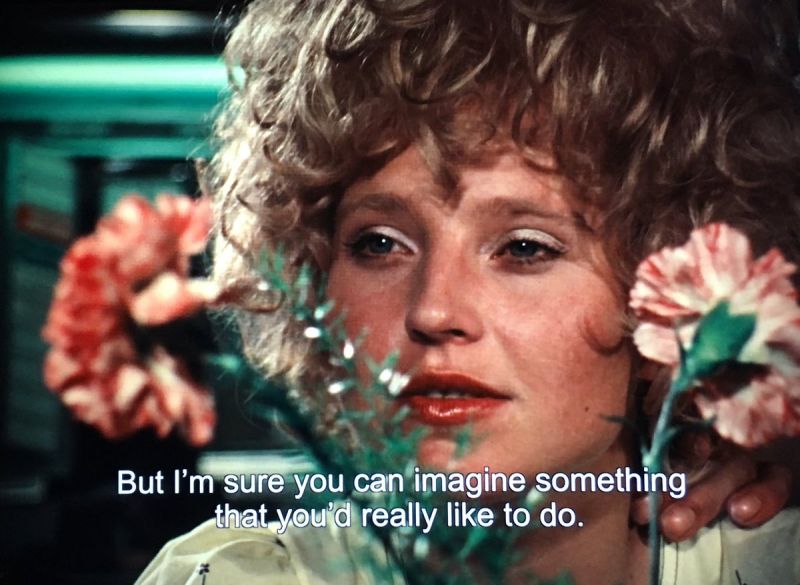
[5]
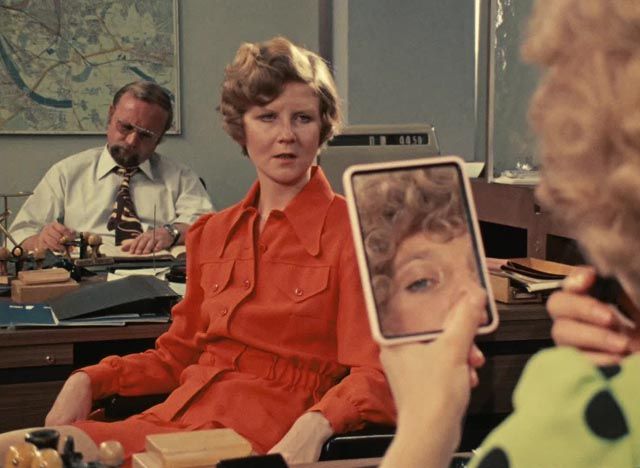
[6]
Text
A row of pickup trucks drives through what looks like the edge of a city, their marker lights cutting through the bluish predawndarkness. In daylight, an elevated train crosses a bridge, carrying workers to their jobs. As theme music plays, the title of the show appears—Acht Stunden sind kein Tag [Eight Hours Don’t Make a Day]—followed by the words “Eine Familienserie” [A family series]. Two workers in bright red uniforms sweep a gray urban plaza, their motions in sync with each other and the intro music. A stone statue of a man hoisting a rope (Nikolaus Friedrich’s Tauzieher [Rope Puller], installed in this Cologne plaza in 1911) towers above them. With this introductory sequence, director Rainer Werner Fassbinder sets the tone for his five-episode series, which was commissioned by Westdeutscher Rundfunk and which aired on West German television in 1972–73. This is a show about labor, about workers’ lives and livelihoods. But—importantly—it’s also about the ways in which work spills into life, what we tend to call “free time” or “family time,” and vice versa. The work of production—and the ways in which workers organize against their own exploitation—is inseparable from the work of social reproduction in capitalist societies like West Germany and the United States. Through this family series, Fassbinder explores how spheres of non-working life shape working-class resistance, and does so for an audience that extends well beyond the left.
The day begins.
***
The series, however, begins at night. The camera is fixed close on a bottle of champagne that Jochen—a tall, gangly young man played by the tall, gangly Gottfried John—is opening for his grandmother. It’s her birthday, a messy affair with four generations of family clustered in a very brown, very 1970s living room. In this initial scene, Fassbinder sets out some of the characters and their dynamics—the eccentric grandmother running the show; Jochen’s sister Monika and her cruel husband, Harald; Jochen’s parents canoodling on the couch; his best friend and factory coworker, Manfred—all of whom structure the series. Fassbinder, commissioned to produce a “working-class family drama for public television,” tests the limits of the form, incorporating a homoerotic scene of the workers showering together in the first episode, for instance, and weaving a critique of capitalism throughout the series.1
Each episode centers on a pair of characters and is titled accordingly. This first, “Jochen und Marion,” thus extends beyond the familial milieu, and introduces Marion. And so, the meet-cute: Jochen is sent to pick up more champagne. He drives Harald’s car (the keys filched by Monika from her husband’s pocket) to a dim automat. There’s one other person there: a slim woman with curly blond hair (Hanna Schygulla) banging her fist against one of the small metal automat doors.
Jochen: Hey!
Marion: Pardon me?
Jochen: I said “Hey.” You’re bashing that thing all up.
Marion: Yes, I heard you say “Hey.”
Jochen: But you said “Pardon me?” Sorry.
Marion: Why would I say “Pardon me?”
Jochen: Because I said “Hey.” Hey, got it?
Marion: Yes, you did say “Hey.” Why?
Jochen: Because you were bashing it all up.
It’s a made-for-TV theater of the absurd. There’s comical stiltedness to their dialogue, with their conversation going in circles and the camera jumping from Jochen to Marion and back. Marion, it turns out, paid two marks for a jar of pickles that the automat won’t release—hence the banging. Jochen, naturally, assumes she’s pregnant: “Who’d be hysterically beating on a pickle vending machine at 9:30 p.m. if she weren’t pregnant?” But she isn’t pregnant, nor “hysterical, or even married,” she tells him. And here the rhythm shifts, the camera snapping back to a close-up of Jochen’s eager face as he realizes Marion is single. For a moment, it’s like watching Pepé Le Pew first catch sight of the cat with white paint on her tail. As Marion berates him—“typical man, running his mouth”—he interrupts to invite her back to his grandmother’s birthday party.
She agrees. Suddenly the two are smiling dopily at each other. But first, the pickles: Jochen carefully pulls down a handle or two; one of the small automat doors opens and he pulls out a jar. “You just have to be a man—sensible and with a clear head,” he tells Marion, self-satisfied, as he starts to leave. She bangs her fist on the wall of doors again and this time, one pops open: another jar of pickles. She sticks her tongue out at Jochen and marches out of the automat with the pickle jar held high. The camera zooms in on the open metal automat door before following the new couple out. Theirs is a winking meet-cute, attuned to the shifting gender politics of the late 1960s. With this scene of the lovers’ first encounter, Fassbinder sets up an engagement with what I’d call the “heterosexual absurd,” Elsea sometimes-playful, sometimes-devastating approach to straight relationships that appears throughout the series and in many of his films as well. The developing relationship between Jochen and Marion comes to structure the following episodes as well, bringing together various separate but overlapping ilieu: the family home, the factory, the newspaper office where Marion works selling ads, the kindergarten, the bar.
In some respects, the series previews Fassbinder’s subsequent films, many of which are marked by an interest in both the realities of working-class life in Germany and the melodrama of love affairs. The Bitter Tears of Petra von Kant (1972), Ali: Fear Eats the Soul (1974), and Fox and His Friends (1975), to name a few major works by the prolific director, all depict protagonists confronting the effects of their social worlds—money, racism, political differences—on their romantic relationships. The cast of Eight Hours features a number of his regular actors as well, including John, Schygulla, Kurt Raab, Irm Hermann, and El Hedi ben Salem (whom Fassbinder met in a Parisian bathhouse in 1971, and with whom he developed a tempestuous romantic relationship); Salem, who had emigrated to Europe from Morocco, has an uncredited role as a factory worker in Eight Hours but would go on to star in Fassbinder’s Ali: Fear Eats the Soul in 1974).
But Eight Hours Don’t Make a Day differs markedly in tone from much of Fassbinder’s later work. In place of the romantic despair of Petra von Kantor the hopelessness and pessimism that pervade much of his oeuvre, the series is relatively light-hearted and ripe with physical comedy: after Jochen, smitten, drops Marion off at home following their first encounter, he says goodbye and walks directly into a construction barricade. Elsewhere, Eight Hours offers a sort of popular optimism—e.g. real love can be found at the automat, working-class organizing effects positive change—that seems to derive as much from the format itself as from Fassbinder’s shifting sensibilities. He injected the sensibility and commitments of worker films into the popular middle-class family TV drama format—and it worked! The series aired on public television at prime time on Saturday evenings, with ratings comparable to the top-rated crime series at the time.2 With the success of the series, popular television proved malleable enough to bring anti-capitalist perspectives to a wide audience.
Marion and Jochen’s relationship, though, is not without (class) conflict. In a brief scene later in the first episode, Marion and her bourgeois colleague talk at the newspaper office where they both sell ads. The colleague swivels her chair around to face Marion, who sits at the desk behind her and whose face we momentarily glimpse in the hand mirror she holds. Picking at the class difference between Marion, with her white-collar job and white-collar ex-boyfriend, and factory worker Jochen, the colleague asks: “Do you really love him, Marion? I mean, strictly speaking, he’s just a worker. Right?” “Are you better than him? If you’re better, say so,” Marion snaps back. “At least I don’t get my hands dirty at work,” her colleague replies, arguing that industrial workers like Jochen “live differently” than the middle class. Their conversations here and throughout the series offer viewers an example of how class anxieties and tensions manifest in capitalist societies like 1970s West Germany. And implicitly—through her sympathetic portrayal as one of the show’s main characters and a driving force for positive change in the lives of other characters—the show suggests that Marion, who pushes against her colleague’s classist assumptions, is in the right. “Boy, you’re stupid. Don’t you do your work for other people?” Marion asks rhetorically, exasperated. Whether on the factory floor or in the office, workers sell their labor to the capitalists who profit from it. To Marion, at least, this much is clear.
***
It’s not only Marion who sees through the inanity of class hierarchies to the fundamentally exploitative nature of capitalism. At the factory, when the boss refuses to pay the bonuses he promised to Jochen and his coworkers, they start to realize that they’re being screwed—and gradually, they start to push back. To start, several workers experiment with some light sabotage, intentionally messing up the tools they’re meant to produce so that the company ends up with a few pieces of scrap. The boss, unfortunately, pins the blame on the sympathetic foreman, who dies of a heart attack shortly thereafter.
The third episode opens in a somber mood: Jochen and six of his coworkers sit quietly around a table in a dark bar, their faces illuminated by electric candles along the walls. An aproned waitress delivers seven glasses of Kölsch, and a couple of the men check her out as she walks away. Jochen takes a few drags of his cigarette. Fassbinder has positioned the camera a short distance back from the open end of the table so that a viewer might feel like they are sitting and drinking beers with the workers, and thus implicated in the conversation. Toasting quietly, the workers down their beers and then get to the matter at hand: With the previous foreman deceased, they’ve encouraged one of their own, Franz, to speak to the boss about taking his place. Franz only needs a bit more training but, as he reports at the bar, “even if I had a foreman’s certificate,” the boss claims that “management wants to fill the position with someone from the outside. […] They’ve had better experiences doing that, he said.”
The camera zooms in on a few of the workers, their furrowed brows and collared shirts under blazers in various shades of brown. They start to move toward an analysis of workplace power: Who decided this? Not the boss—“He’s just implementing a directive from above,” Franz relays, enunciating the phrase pointedly. How do decisions at work get made? Their boss only knows “what they think up top,” Jochen notes, tearing off a piece of bread with his teeth. “He has no clue what we want.” Another worker agrees, and he continues: “But that means we have to let him know what we want.” The camera closes in on Jochen’s face again, and for a moment it takes up the entire frame. Fassbinder is marking—with the heavy-handedness of a TV soap—the gravity of the moment, its significance to the struggle of these workers in the episodes to come. Because it’s immediately clear that they don’t mean simply making their opinions known to the boss. They want to change how decisions are made at work, and who makes them. They’re not just mad; they’re going to do something about it.
Back at the factory, several workers confront the boss about management’s insistence on hiring a new foreman from outside the company. The boss, with his pristine white coat and sinister goatee, sits in his chair, swiveling, as the standing workers loom large around him. Fassbinder cuts to their faces, one after another. They speak—not as individuals, but on behalf of the “workforce”—of their desire to have Franz as their foreman; they push back against the boss’s excuses, his deferral of responsibility, and squeeze from him a promise to put in a good word for Franz if he passes his foreman’s exam. “I believe he’s shitting his pants, if I’m not entirely mistaken,” one worker shares once the group returns to the factory floor. Fassbinder cuts back to the boss, who, unbeknownst to the workers, calls the newspaper to ask if they can print the job listing for the new foreman position without the company’s name. “We can pressure him into meaning what he says,” Jochen chimes in.
The fight, however, is far from over—the following episodes feature a new foreman, new tactics, and new solidarities built among the workers and with their communities. In many respects, their approach echoes organizing models developed decades earlier, such as William Z. Foster’s 1936 pamphlet Organizing Methods in the Steel Industry. Foster, writing in support of labor organizing in US steel mills, urges workers to “only rely upon themselves and the support they get from other workers”—not capitalist politicians or political institutions—yet, crucially, to also draw on the support and solidarity of their immediate communities, including women and youth as well as fraternal societies and church congregations.3 Organizers, most notably the workers of Amazon Labor Union, have revisited his approach in recent years, and contemporary organizers and writers like Jane McAlevey have drawn on his insistence on engaging workers’ communities as part of a holistic union fight.
Moreover, the scenes of working-class organizing in Eight Hours Don’t Make a Day—on and off the shop floor—reflect the major political and economic shifts of the era. The poverty and destruction of World War II–era Germany had given way, starting in 1948, to a period of intense economic growth, particularly in capitalist West Germany. The economic miracle also provided Germans with a means of burying their country’s Nazi past under a rampage of wealth accumulation and consumerism. Fassbinder would later take on this period directly in his BRD Trilogy (The Marriage of Maria Braun [1979], Lola [1981], and Veronika Voss [1982]). In 1967, West Germany experienced its first recession since the onset of the economic miracle, shifting the relationship between capitalists and labor. Significantly, Germany’s union for metal workers, IG Metall, has historically been one of the country’s more militant unions, and was successful in pushing for major gains like the forty-hour work week and paid vacation time in the decade before Fassbinder made the series. The broader leftist upheaval of the 1960s—especially the success of independence movements in formerly colonized African countries, including Algeria, Kenya, and Angola, in the early ’60s, and the 1968 student protest movements in West Germany as well as France, the US, and elsewhere—offers further context for the organizing by workers (and tenants and squatters and so on) in Eight Hours Don’t Make a Day.
***
In the scene following the workers’ first small victory for Franz in the boss’s office, Jochen and Manfred walk into Marion’s apartment, where she immediately presents them with a suspicious classified ad in the newspaper. It’s for a foreman position at the company where they work; despite his promise to wait until the results of Franz’s foreman exam, the boss has gone ahead and advertised the position. “What a bastard,” Jochen mutters. Around the kitchen table, he, Manfred, Marion, and Monika weigh the consequences of telling Franz now (he might quit) or holding off (he might be angry they didn’t tell him earlier). Together, they decide that Franz deserves to know right away, and Jochen and Marion head to his home to tell him.
The juxtaposition of these two scenes makes clear the inextricability of home life from work life—particularly when it comes to organizing to transform conditions in both. Throughout Eight Hours Don’t Make a Day, Fassbinder moves between workplaces and spaces of social reproduction (e.g. home, school) to reveal how each relies on, reinforces, and produces the other. In his study of Black working-class resistance in the United States, Robin D. G. Kelley asks, “How do conflicts and the exploitation of labor power within the locus of the family and household shape larger working-class politics?”4 To me, this question—though Fassbinder’s TV series predates it by two decades—serves as a guide for thinking about the political project of Eight Hours, its family-friendly engagement with anti-capitalist organizing. Kelley draws on feminist labor historians like Carolyn Steedman and Elizabeth Faue to make the case that “class identities and ideologies are not simply made at work or in collective struggles against capital,” but in spaces of social reproduction as well.5 In its particular time and place, though with implications beyond it, Eight Hours Don’t Make a Day illustrates this truth in a way that’s nuanced yet accessible and fun. The series makes transforming conditions for working-class people seem possible, even if it takes all twenty-four hours of the day.
“Rainer Werner Fassbinder: Eight Hours Don’t Make a Day,” The Criterion Collection, https://www.criterion.com/films/29400-eight-hours-don-t-make-a-day.
“40 Years Ago: RWF’s EIGHT HOURS ARE NOT A DAY,” Fassbinder Foundation, October 29, 2012, http://ww2.fassbinderfoundation.de/node.php/en/news_detail/303.
William Z. Foster, “Organizing Methods in the Steel Industry” (New York: Workers Library Publishers, 1936), https://www.marxists.org/archive/foster/1936/10/organizing-methods-steel-industry/index.htm.
Robin D. G. Kelley, Race Rebels: Culture, Politics, and the Black Working Class (New York: Free Press, 1994), 36.
Kelley, Race Rebels, 37.

[1]

[2]

[3]

[4]

[5]

[6]
“Rainer Werner Fassbinder: Eight Hours Don’t Make a Day,” The Criterion Collection, https://www.criterion.com/films/29400-eight-hours-don-t-make-a-day.
“40 Years Ago: RWF’s EIGHT HOURS ARE NOT A DAY,” Fassbinder Foundation, October 29, 2012, http://ww2.fassbinderfoundation.de/node.php/en/news_detail/303.
William Z. Foster, “Organizing Methods in the Steel Industry” (New York: Workers Library Publishers, 1936), https://www.marxists.org/archive/foster/1936/10/organizing-methods-steel-industry/index.htm.
Robin D. G. Kelley, Race Rebels: Culture, Politics, and the Black Working Class (New York: Free Press, 1994), 36.
Kelley, Race Rebels, 37.
